
Top to bottom: Campers at the October campout sing along to one of Natti Lovejoys’ favorite Bob Marley songs; East Atlanta YMCA Youth enjoy the Children’s Forests campout at Lake Winfield Scott Recreation area in Blairsville, Georgia
![]() Photos by Steve Bekkerus
Photos by Steve Bekkerus
When awe and amazement drive you, there’s no telling where you might find yourself. But wherever it is, you can bet it’s satisfying, and almost certainly it’s inspiring.
I have always had an infectious sense of wonder and a passion for sharing my new findings. As the partnership coordinator for the Children’s Forest Network of the Georgia Mountains, I have spent the past 18 months connecting land managers, communities and non-profits to a wide-range of innovative programs that help stimulate an interest in the outdoors for young people across north Georgia. I joined an impressive crew of partners who were successfully engaging kids through a variety of individual efforts in partnership with the Chattahoochee-Oconee National Forests. The Children’s Forest Network (CFN) brought them all together with a particular focus on addressing cultural and financial obstacles that prevent underrepresented youth from becoming engaged in outdoor experiences — by providing opportunities to explore the forests in their backyards, empowering teachers to connect with the outdoors and lead their students into the forest for meaningful, place-based learning experiences, and helping ensure the long-term health of our national forests by fostering an ethic of stewardship among young people.
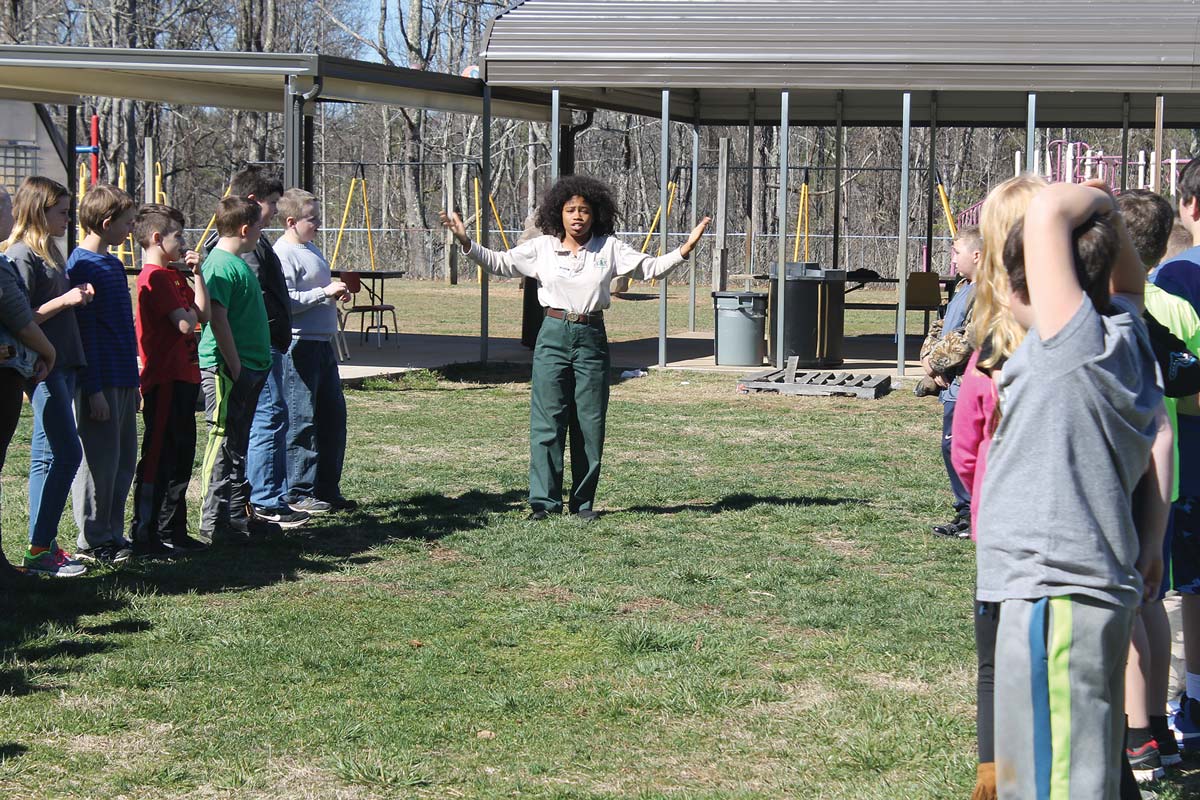
Michela Williams plays a game called “Oh Deer” with a group of 5th graders at West Fannin Elementary. This game teaches children about population control and predators
![]() Photos by Susie Stevens
Photos by Susie Stevens
I didn’t necessarily grow up with a love of nature, and never planned on a career of inspiring others to love it. Armed with a degree in economics, I took a chance by responding to an offer through the Greening Youth Foundation, an Atlanta-based non-profit that focuses on promoting diversity and inclusion on public lands. As I began to work with the kids, and learn from the people in the U.S. Forest Service and all the volunteers and partners, my fear of the unknown began to go away. Today, I’m not only coordinating north Georgia’s Children’s Forest Network, but I also serve as the Atlanta representative and secretary on the Appalachian Trail Conservancy’s (ATC) Next Generation Advisory Council (NextGen). The ATC and the Georgia Appalachian Trail Club (GATC) are key partners in the Children’s Forest effort.
My drive to promote inclusion of underrepresented youth in the outdoors has allowed me to successfully secure grants and invite groups to the CFN’s first urban campout. I have had the pleasure of attending multiple career fairs and sit on Georgia State University’s Career Panel, and discuss my daily routine as partnership coordinator to encourage upcoming graduates. With the help of my fellow U.S. Forest Service coordinator Mitzi Deaton, I have been able to travel to more than 20 schools in Georgia and educate children about public lands, National Forests, and the A.T., including macroinvertebrates, watersheds, animals, Leave No Trace Principles, and share Smokey Bear’s wildfire prevention messages. I have also been featured in Georgia’s Environmental Education Alliance’s spring web blog under the “Fresh Faces, Fresh Ideas” column. My hope is to continue to teach environmental education and foster stewardship to youth who may have less access and opportunity to the great outdoors. The best part about my job is watching little faces light up with curiosity. I love how one question turns into 15, and they want to learn even more. “After only a couple of years of working together, public and private partners in the Children’s Forest Network are achieving collective impact by placing a priority on equity, and seeking access for underrepresented youth to the outdoors,” says the ATC’ director of education and outreach Julie Judkins. “Social injustices affect those in urban and rural settings alike, including the opportunity to play, work, and be in the outdoors, and this partnership strives to remove barriers to those experiences. By hosting multiple facets and diverse program components outdoors, we hope to close the opportunity gap.”
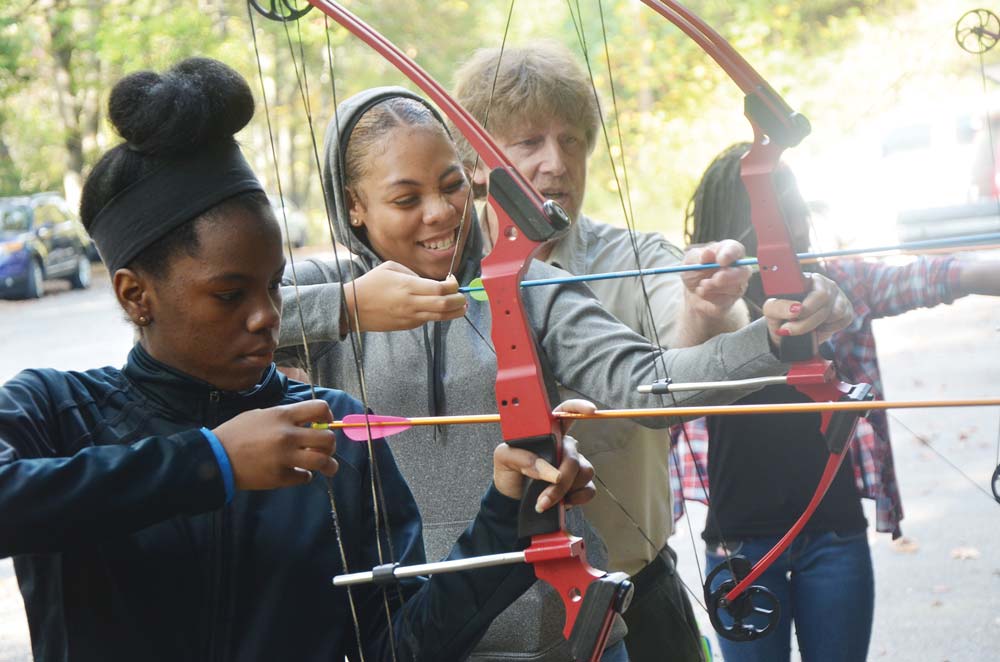
Panola State Park archery instructor, Brian Lanier, teaches one of the YMCA counselors to focus her aim at the campout
![]() Photos by Steve Bekkerus
Photos by Steve Bekkerus
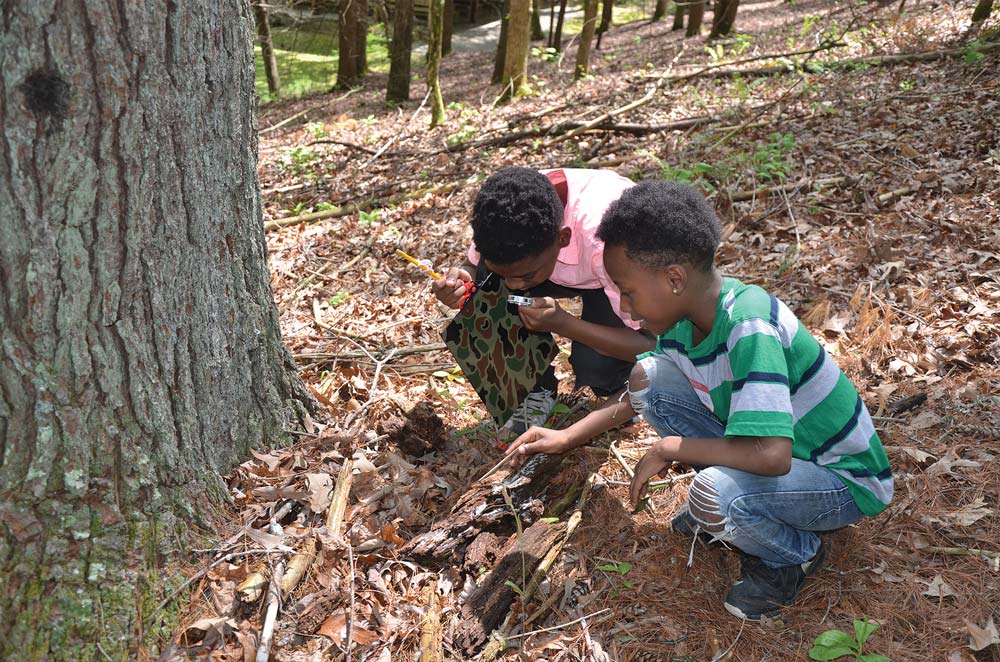
Students look for insects and other small organisms in order to understand what inhabits a tree during a University of Georgia Education Center Field Day last Spring
![]() Photo by Michela Williams
Photo by Michela Williams
The CFN bloomed in response to a growing disconnect with the natural world, especially among young people. Despite having 875,000 acres of national forest lands in Georgia within two hours of major metropolitan areas, many north Georgia youth have little awareness of these places that offer so many health and quality-of-life benefits. Urban and rural youth alike often lack opportunities to participate in life-changing experiences in the outdoors. This network supports and enhances the existing efforts of partners with a focus on inclusion of those within the opportunity gap. Existing partners include the Greening Youth Foundation, the ATC, GATC, Georgia Mountain Research and Education Center, Cabela’s, and the U.S. Forest Service. Since its inception in 2015, the CFN has reached more than 15,000 young people through a range of programs. Throughout 2017, 680 young people experienced guided Appalachian Trail hikes and 447 young people participated in overnight treks in the national forests. More than 10,000 students have been reached with conservation education programs, including 5,542 fourth graders with information about the Every Kid in a Park (EKIP) program. EKIP is an initiative put in place to provide fourth graders free passes to all national parks and forests.
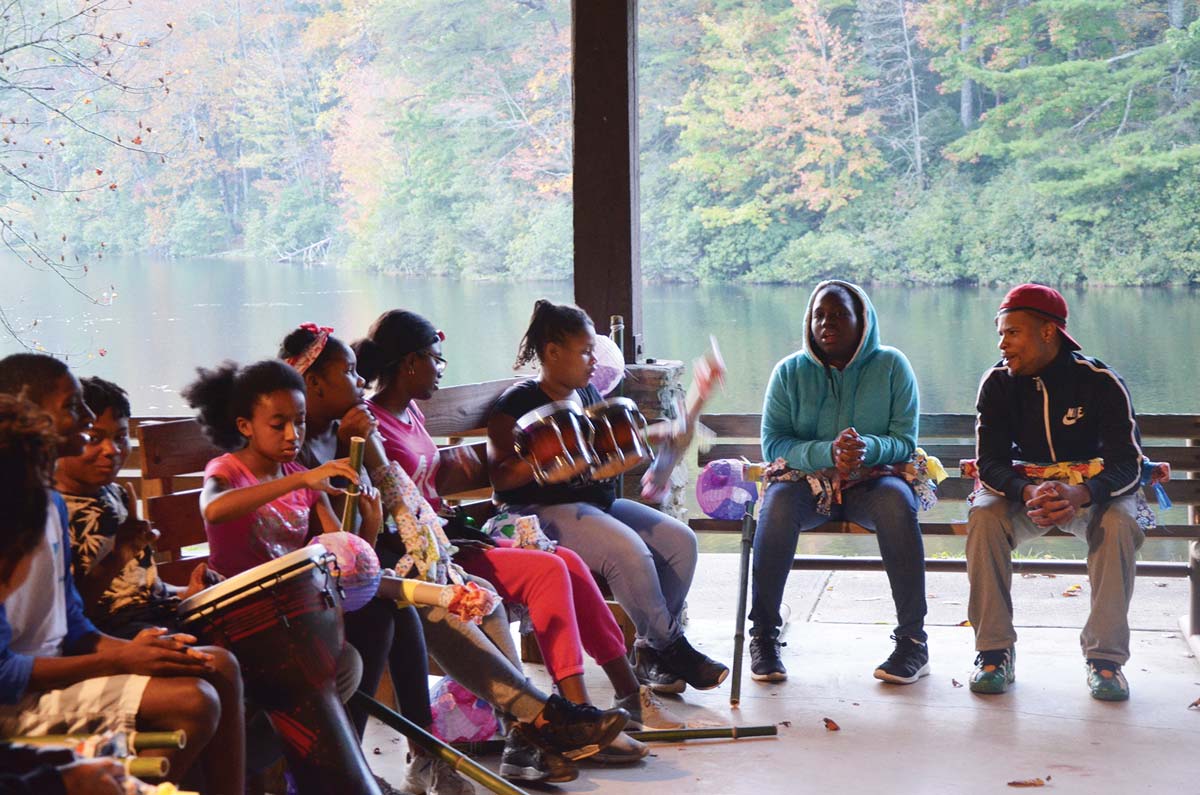
Campers play instruments they made along to the tunes of the Blairsville band Natti Lovejoys
![]()
The ATC helped support and develop a custom Forest for Every Classroom (FFEC) curriculum for urban educators. Building off a successful training last March, another teacher training is scheduled for March of 2018. FFEC trains educators in place-based service learning to support curricula development that fosters appreciation for public lands, and encourages regular, sustained, meaningful interactions with nature, the A.T., and national forests. The training is hosted at Amicalola Falls State Park and the Len Foote Hike Inn and provides about 30 teachers from diverse schools, grades, and subjects the opportunity to connect with about 10 organizational and agency partners in a two-day workshop. This variety amongst teachers allows them to compare current educational practices and discuss solutions to common issues they may have while in the classroom. Partners attended this conference to introduce themselves and the resources they can offer educators. Teachers enjoyed learning from both the partners and amongst themselves about the accessible natural environment near their schools. The teachers completed a survey and were asked, “What is the one thing that you learned from this workshop that you will take back with you and put into practice immediately?” One teacher’s response was, “Stop dreaming about taking kids on super adventures and start taking kids into the school yard to learn, appreciate, and observe their local environment!” After the conference, teachers were encouraged to create a lesson plan and submit it to the FFEC steering committee in order to win a free trip to the Len Foote Hike-Inn with their students, thanks to the support of the GATC. The classes that were awarded this trip were from Smoke Rise Elementary and Cedar Shoals Elementary. With both schools having populations of 57.7 percent African American and more than 20 percent Hispanic, our mission to encourage the inclusion of underrepresented youth was definitely achieved. “This type of dynamic coordination is a shining example of how NextGen leaders are integrating and bridging traditional A.T. partners with new organizations and people, and making connections from urban centers to A.T. Communities,” says Judkins. “The ATC is thrilled to be a partner in the CFN and grateful to have someone like Michela at the helm.”
![]()
This past October, students from the East Atlanta YMCA participated in a campout in the Chattahoochee-Oconee National Forests. This campout was held at the Lake Winfield Scott Recreation area in Blairsville and the age range for the campers was 11 to 16. Partners from the network attended to offer assistance with cooking, facilitating, and sharing their own stories about how they fell in love with the outdoors. As new campers, the students learned how to put up a tent with the help of GATC and received their very own sleeping bag to take home thanks to an Outdoor Funding grant provided by Cabela’s. This campout offered a variety of activities such as archery, educational hiking, crafts, educational games, and a lesson in animal furs. Campers also had the pleasure of learning how to build a fire from Environmentalist Forest Hilyer and playing music with the Blairsville-based reggae band Natti Lovejoys. The Cabela’s grant funded food, transportation, and gear for the campers and also supported the chaperons who attended. The attendance of the YMCA chaperons was essential because these students had never been tent camping. Seeing an adult from a similar background step out of their comfort zone to try something new really calmed the students’ fear of the unknown. Campers began to be more open to the environmental activities and sleeping in a tent. A survey was sent home with the campers asking basic questions about camping and their exposure to the outdoors. They were asked “if there was one thing you could change about this campout what would it be?” One student’s answer was “if there was anything to change it would be the amount of days we stayed there.” This campout, and other programs CFN offers, allows youth to truly connect with nature and build a bond with the outdoors that they want to share with their families. Transportation funding through CFN has created opportunities for urban youth to participate in all of these activities.
![]()
A series of environmental field days were attended by 4,000 students, primarily from Title I schools with an event dedicated to urban students. These field days are hosted by the Georgia Mountain Research and Education Center of the University of Georgia and provide education for students in the third-to-fifth grades. This event is held annually in the A.T. Community of Blairsville, Georgia and brings in volunteers and staff from partner organizations, agencies, and clubs to lead sessions. Students rotate into various outdoor classes taught by professionals from organizations such as Natural Resource Conservation and GATC volunteers. Some of the classes included Leave No Trace, fire prevention, tree identification, stream macroinvertebrates, and more. In the past, these field days have served students from Hall, Fannin, Towns, and Union counties in Georgia and Cherokee and Clay counties in North Carolina. These field days not only allow students to learn in a natural setting but they also expose students to natural resources they were unaware of before. As word of the field days continues to spread, the number of students attending continues to increase.
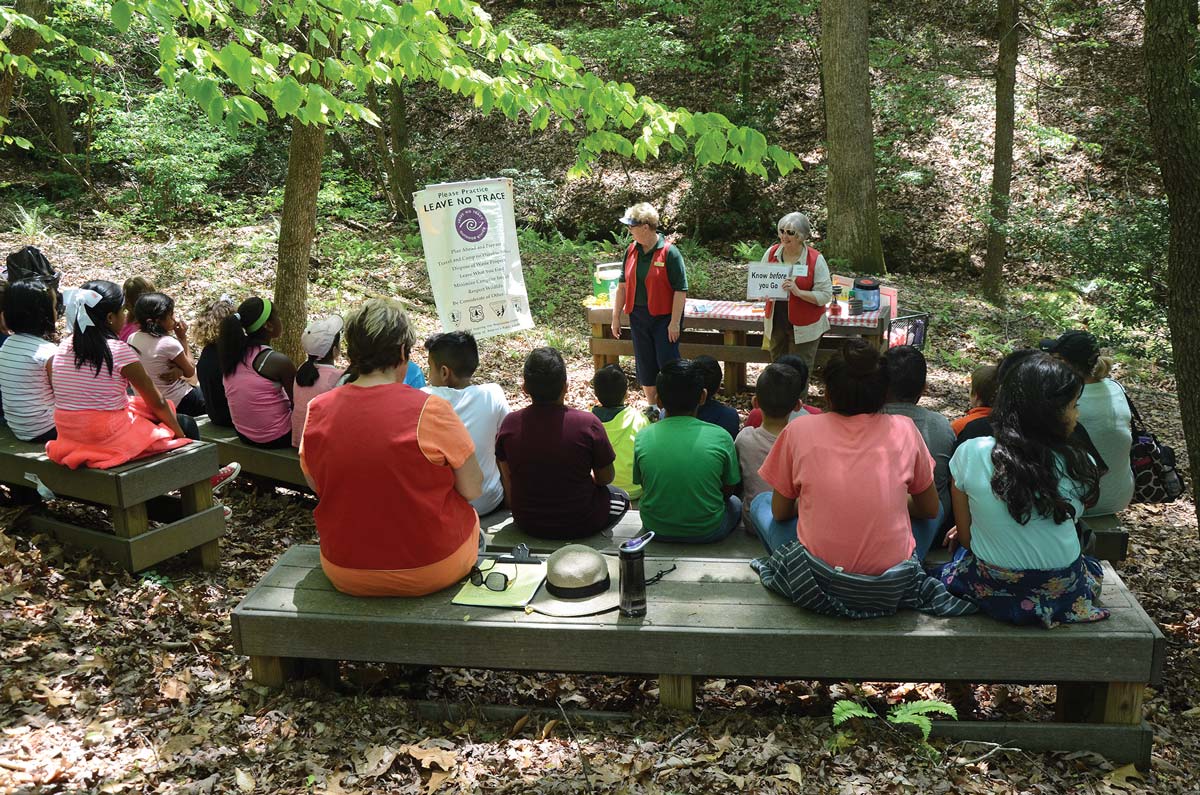
Volunteers from the Georgia Mountain Research and Education Center of the University of Georgia teach students the seven Leave No Trace Principles at the spring Field Day
![]() Photo by Michela Williams
Photo by Michela Williams
“It’s an honor to work closely with Michela and others and see the work we do through her eyes,” says U.S. Forest Service staff officer for Chattahoochee-Oconee National Forests, Judy Toppins. “[They have] a strong sense of social justice, and we share the belief that helping bridge a connection to the outdoors for these young people is about more than just providing opportunities where there weren’t many … it’s about equality. There are profound physical, emotional, intellectual and spiritual benefits to time spent in the outdoors, and every child deserves that experience. Every child has a right to it. Michela makes powerful connections with these kids and relates to their fears and challenges. She is an absolute force of nature, and I believe that together with our many partners, she is changing lives.”
The CFN continues to communicate with new partners and discuss ways to close the opportunity gap for access, recreation, and employment in the outdoors to youth in north Georgia. And for me, it’s a shared experience with the kids … becoming attuned to and fascinated by nature.
Michela Williams works as a Greening Youth intern for the U.S. Forest Service in the Chattahoochee-Oconee National Forests and is an ATC NextGen Council member.